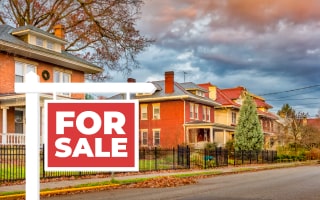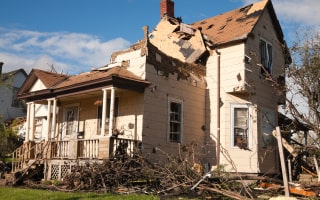Home Buying in West Virginia

West Virginia, the Mountain State, offers scenic beauty, small-town charm, and affordable living. From the rolling hills of the Appalachian Mountains to historic towns and vibrant communities, West Virginia provides diverse living environments attractive to many homebuyers. West Virginia appeals to those seeking a quieter, more affordable lifestyle with a lower-than-average cost of living, strong local job markets, and access to outdoor recreational activities.
However, navigating West Virginia's housing market can present challenges. Some regions, particularly near metropolitan hubs like Morgantown and Charleston, are experiencing rising home prices and limited housing supply. Buyers in these areas may face increased competition and faster-moving markets.
The West Virginia housing market is diverse, offering a range of options in various settings. While home prices vary depending on the region, West Virginia remains more affordable than the national average. The median home price is around $190,000, significantly lower than neighboring states like Virginia and Maryland. As a result of this affordability, more and more people continue to move into the state more than move out. In high-demand areas, homes may sell quickly, sometimes within a month, while more rural locations often have more availability and longer market times.
Before entering the West Virginia housing market, buyers should be prepared to research state housing trends, understand local and regional differences, and consider factors such as commute times, school districts, and property taxes. Working with a knowledgeable local real estate agent is crucial for navigating the market and finding a home meeting your needs and budget.
West Virginia Housing Trends
Understanding West Virginia's dynamic housing market is key to making informed decisions.
Here are some important trends and statistics homebuyers should be thinking about:
-
West Virginia Median Home Price
The median home price in West Virginia is around $190,000, making it one of the more affordable states in the country. This figure is significantly lower than the national average, but prices vary greatly depending on location. In cities like Morgantown, which is influenced by the presence of nearby West Virginia University, and in the capital city of Charleston, prices are higher, with median home prices hovering around $250,000. Meanwhile, rural areas and smaller towns offer even more affordable options, with homes often priced as low as $150,000 or less.
-
Number of Homes Sold
West Virginia's real estate market remains relatively steady, with approximately 1,100 homes sold monthly. While the market isn't as fast-paced as in more urbanized states, there has been constant demand for homes in suburban and rural areas, especially as more people seek affordable housing and a more tranquil environment. Morgantown, Charleston, and Huntington are the most active areas for real estate, driven by local industries and educational institutions.
-
Median Days on Market
Homes in West Virginia typically stay on the market for about 45 days. However, this figure varies depending on location and property type. In popular areas like Morgantown, homes sell faster, particularly close to the university or major employers. In more rural parts of the state, homes may remain on the market longer, sometimes up to 60 days or more, depending on current demand and availability.
-
Housing Supply Statistic
West Virginia has a more balanced housing market than many other states. As a generally rural state, there tends to be more land available for housing developments, especially outside major urban areas. However, housing supply has been tighter in cities like Charleston and Morgantown, leading to increased competition and slightly higher prices. The demand for affordable single-family homes in suburban and rural areas remains strong, driven by a growing interest in less densely populated areas.
How to Find the Right Home to Buy in West Virginia

When it comes to home buying in West Virginia, a buyer can take no more important step than partnering with a local professional real estate agent. Navigating the state's diverse housing market requires expert guidance from a local agent who can help you understand regional trends, housing availability, pricing, and how available homes align with your budget and preferences. Be sure to choose a licensed local agent with good communication skills, state experience, and strong references. You can also ask family and friends for referrals.
Choosing the Right Home
Several key factors must be considered when searching for the perfect home in West Virginia. The state's diverse geography offers a range of living environments, each with its own advantages that influence everything from commute times to property taxes.
Location
West Virginia provides a mix of urban, suburban, and rural living options, catering to various preferences and lifestyles. The location you choose will impact your proximity to jobs, schools, and other essential services.
Consider these location influences:
-
Urban vs. Suburban vs. Rural: Cities like Morgantown and Charleston serve as the state's urban hubs, offering access to jobs, cultural amenities, and educational institutions like West Virginia University. These areas typically come with higher home prices, but provide the convenience of being close to major employers, government offices, and healthcare providers. Suburban areas like Bridgeport, Hurricane, and Teays Valley provide family-friendly neighborhoods, top-rated schools, and more space while offering access to employment centers. For those looking for peace and affordability, rural areas such as the eastern panhandle or southern counties offer larger properties, lower home prices, and a laid-back lifestyle, making them ideal for outdoor enthusiasts or those seeking privacy.
-
Proximity to Work: West Virginia's major employment hubs are in Charleston, Morgantown, and Huntington, so living nearby can significantly reduce commute times for those working in healthcare, education, or government sectors. Suburban and rural areas present appealing options for individuals working remotely or looking for a more affordable lifestyle with lower home prices and tranquil living conditions.
-
Public Transportation: Public transportation is limited across most of West Virginia, particularly in rural regions. Bus systems are available in urban areas such as Charleston and Morgantown; most residents rely on personal vehicles for commuting. Easy access to major highways like I-64 and I-79 is key for buyers who frequently travel for work or personal reasons.
-
Property Taxes: West Virginia boasts a relatively low property tax rate, averaging around 0.59%, lower than the national average. Property taxes can vary based on location. Urban areas like Morgantown and Charleston see slightly higher rates due to increased property values, while more rural regions typically offer lower taxes. This is an important factor to consider when budgeting for homeownership in the state.
Types of Homes in West Virginia
West Virginia offers a range of housing types that cater to different preferences and lifestyles:
-
Single-Family Homes: Single-family homes are the most common type of home in West Virginia, especially in suburban and rural areas. They offer privacy, yard space, and independence, making them ideal for families or individuals seeking more room.
-
Condominiums and Townhomes: Condos and townhomes are less common in West Virginia, but can be found in cities like Morgantown and Charleston. They offer low-maintenance living and are popular with young professionals and university students.
-
Manufactured and Modular Homes: Manufactured and modular homes are popular in West Virginia's rural areas due to their affordability. These homes offer many of the same features as traditional homes but at a lower cost.
-
Historic Homes: West Virginia has a rich history. Many older homes, particularly in towns like Shepherdstown and Harpers Ferry, offer unique charm and historical significance. However, due to their age, these homes may require additional maintenance, which should be included in your homebuying budget.
The Home Buying Process in West Virginia
When buying a home in West Virginia, you'll need to follow a series of steps:
- Get prequalified for a home loan.
- Partner with a local realtor.
- Make an offer on your dream home.
- Schedule a home inspection.
- Close on your new home.
How to Finance Your West Virginia Home Purchase

There are several ways to finance a home purchase in West Virginia, depending on your financial situation and the type of property you're buying. Homebuyers in the state can choose from traditional mortgage options or government-backed loans, each offering distinct benefits to suit different needs.
![]() Traditional Mortgages
Traditional Mortgages
Traditional mortgages are a common choice for West Virginia homebuyers, with two primary types available:
- Fixed-Rate Mortgages: Fixed-rate mortgages provide stability with consistent interest rates and predictable monthly payments throughout the life of the loan. This option is ideal for buyers seeking long-term certainty and those who plan to stay in their homes for many years.
- Adjustable-Rate Mortgages (ARMs): ARMs offer lower initial interest rates that can change over time based on market conditions. This option is best for buyers who plan to sell or refinance before the rate adjusts, but it comes with the risk of higher payments in the future.
Local lending institutions like United Bank and First Community Bank are popular among homebuyers because they offer competitive rates for fixed-rate and adjustable-rate mortgages and personalized services to help buyers find the best loan.
![]() Government-Backed Loans
Government-Backed Loans
Government-backed loans provide valuable benefits for qualified homebuyers, such as lower down payments and more flexible credit requirements.
In West Virginia, several options are available:
- FHA Loans: Insured by the Federal Housing Administration, FHA loans are popular among first-time buyers or those with lower credit scores. These loans allow for lower down payments and are more accessible to buyers with less-established credit.
- VA Loans: VA loans are available to veterans and active-duty military members. They offer no down payment and competitive interest rates. This option is available to most military families and individuals who have served in the armed forces.
- USDA Loans: USDA loans are designed for homebuyers in rural areas and offer no down payment with low-interest financing. Many of West Virginia's rural communities, particularly in the eastern panhandle and southern counties, qualify for USDA loans, making them an excellent option for buyers in these regions.
![]() Down Payment Assistance Programs
Down Payment Assistance Programs
West Virginia also provides programs to assist with down payments and closing costs, making homeownership more attainable for first-time buyers or those with limited savings. The West Virginia Housing Development Fund offers low-interest loans and down payment assistance to qualified buyers, helping ease the burden of upfront costs. Additionally, local governments may provide additional assistance programs, so exploring options within your specific region is important.
Home Insurance in West Virginia

The average cost of home insurance in West Virginia is around $1,300 annually, though premiums vary based on the location and type of coverage. Homes in areas prone to flooding, such as near rivers or low-lying regions, may require additional flood insurance. Additionally, the state's rugged terrain and forested areas mean some homeowners may need to consider insurance for risks like landslides or wildfires. Studies have shown Morgantown and Fairmont are the cheapest big cities for homeowner's insurance in the state, while Oak Hill and Dunbar are the most expensive.
Home Buying Challenges in West Virginia
West Virginia's housing market, while affordable, presents several challenges:
-
Limited Inventory: In certain areas, particularly around Morgantown and Charleston, the supply of homes is limited, leading to increased competition among buyers.
-
Rising Home Prices in Certain Areas: While West Virginia's overall home prices remain low compared to national averages, some areas, particularly those near universities or major employers, are seeing home prices rise.
-
Natural Disasters: West Virginia's geography means certain areas of the state are prone to flooding and other natural disasters that can impact insurance costs and property value. Homebuyers should know about flood zones and other risk factors when choosing a location.
West Virginia Home Inspections
A few common home inspection problems revealed before real estate sales in West Virginia are roof problems and structural integrity issues. These could stem from the common winter storms, thunderstorms, tornadoes, and floods in West Virginia. Before buying a property, a West Virginia home inspection is critical to uncovering any hidden flaws, damage, or issues that could be costly later. By renegotiating the price, West Virginia buyers can save money if anything serious is found.
A home inspection in West Virginia is a physical inspection of the entire property, focusing on the major systems, structural integrity, safety features, and appliances. Some of the items included will be:
-
Interior: Examines the condition of the walls, windows, doors, ceilings, floors, stairs, looking for any signs of damage, rot, or insect damage.
-
Exterior: Walls, windows, doors, roof, gutters, downspouts, decks, porches, and driveways.
-
Foundation: Checks the foundation for signs of cracking, settling, or water damage.
-
Roof: Checks the shingles, flashing, vents, gutters, downspouts, skylights, and chimneys to evaluate the condition and signs of damage.
-
Electrical: Examine the electrical wiring, circuit breakers, fuses, outlets, and light fixtures for proper working order and safety issues.
-
Plumbing: Checks the pipes, water supply, drainage system, water heating equipment, and fixtures (toilet, tub, shower, sinks, faucets) to ensure there are no leaks or problems with the water and sewage systems.
-
Heating/Cooling: Examines the heating and cooling systems, ventilation, ductwork, and thermostats to ensure they operate correctly.
-
Insultation/Ventilation: Attics, crawlspaces, basements, and insulation.
-
Fireplaces/Chimneys: Checks the fireplace or fuel-burning appliances to check for proper functioning and safety.
-
Appliances: Tests the built-in and free-standing appliances to ensure they work.
-
Safety: Checks the smoke alarms, sprinkler system, and carbon monoxide detectors to ensure they work.
A West Virginia home inspection costs between $225 and $600, with the average being about $400. The price will vary based on the size of the home and the specific inspection services ordered.
The Process
While not legally mandated in West Virginia, the home inspection is strongly recommended for every buyer. It helps reveal any issues before purchasing. Therefore, the buyer is the one to pay for it. The process of a West Virginia home inspection is as follows:
- Find a reputable, local home inspector with whom they want to work.
- Schedule the home inspection at the right time.
- Show up and stay for the entire inspection. Ask questions as necessary. The complete inspection will take between two and three hours.
- Review the final report and decide where to go from there.
The top five home inspection companies in West Virginia are:
- Freedom Home Inspections LLC - Scott Depot, WV
- HeRo Home Inspections - Morgantown, WV
- Dash Home Inspection - Martinsburg, WV
- Certified Home Inspection LLC - Charleston, WV
- Open Door Inspection Company - Lost Creek, WV
After the Inspection
After the inspection, the inspector must put all the findings into a written report for the buyer. They give copies to all interested parties. The buyer then has some options available to them if the report finds things that need fixing. The options are as follows:
- Save money by negotiating a lower price due to the repairs needed.
- Ask the seller to make the repairs before closing.
- Ask for a home warranty.
- Secure a reduced down payment.
- If significant issues are found, the buyer can even walk away from the deal without losing any money.
Inspection Top Cities
| City | Inspection Cost | Local Issues | Local Rules | Local Home Types |
|---|---|---|---|---|
| Home Inspection in Charleston | $350-$600, depending on the square footage of the house and its age. | Roof, plumbing, electrical, and structural problems. | No local rules. | Single-family, Colonial, and Contemporary homes. |
| Home Inspection in Morgantown | $300-$600 based on the age and size of the home. | Roof, plumbing, drainage, termites, and poor ventilation. | Inspectors must follow West Virginia's Standards of Practice for Home Inspectors. | Single-family, townhomes, and condos. |
| Home Inspection in Parkersburg | $300-$600 based on the home's size, age, and other factors. | Roofing, electrical, plumbing leaks, and HVAC issues. | Governed by the West Virginia State Fire Marshal's office and the City of Parkersburg's building and code enforcement department. | Single-family, condo, and townhomes. |
| Home Inspection in Wheeling | Around $350 for most inspections but can range from $200-$400 depending on the home's size and features. | Roof, foundation, inadequate insulation, mold, and foundation cracks. | Inspectors must be certified by the West Virginia State Fire Marshal. | Single-family, townhomes, condos, multi-family dwellings, and duplexes. |
| Home Inspection in Weirton | $300-$500, with the average being around $343. | Roof (leaks, damage, poor installation), wiring, and HVAC. | Follows state guidelines. | Single-family, Victorian, Ranch, Colonial Revival, Bungalow, and Contemporary. |
How to Navigate the West Virginia Housing Market
Buying a home in West Virginia offers a range of options, from the urban conveniences of cities like Charleston and Morgantown to the serene, rural settings in the eastern panhandle and southern parts of the state. The state's affordable housing market, a strong sense of community, and access to outdoor recreation make it an appealing choice for many homebuyers. However, navigating the puzzle is not without challenges. There is a limited housing supply in some areas of the state, rising prices near major employment hubs, and environmental risks such as flooding in low-lying regions.
Preparation is key for West Virginia homebuyers. By understanding local housing trends, financing options, and the unique challenges of each region, buyers can make informed decisions and secure the best home for their needs. Partnering with a local real estate agent is also essential to gaining insight into the market and ensuring you find the right home that fits your budget and lifestyle.
With careful planning, thorough research, and the right guidance, finding your dream home in the Mountain State is a realistic and attainable goal. Whether you're drawn to its bustling college towns, tranquil rural landscapes, or somewhere in between, West Virginia has much to offer those ready to put down roots in this beautiful state.
Home Buying Guide
- Home Buying in West Virginia
- West Virginia Housing Trends
- How to Find the Right Home to Buy in West Virginia
- How to Finance Your West Virginia Home Purchase
- Home Insurance in West Virginia
- Home Buying Challenges in West Virginia
- West Virginia Home Inspections
- How to Navigate the West Virginia Housing Market
Instant Access to West Virginia Property Records
- Owner(s)
- Deed Records
- Loans & Liens
- Values
- Taxes
- Building Permits
- Purchase History
- Property Details
- And More!
Home Buying Guide
- Home Buying in West Virginia
- West Virginia Housing Trends
- How to Find the Right Home to Buy in West Virginia
- How to Finance Your West Virginia Home Purchase
- Home Insurance in West Virginia
- Home Buying Challenges in West Virginia
- West Virginia Home Inspections
- How to Navigate the West Virginia Housing Market